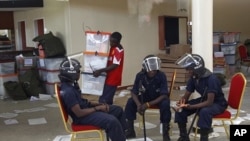There have been sporadic incidents of violence in Zambia as the country waits anxiously to hear the outcome of national elections held Tuesday. With about half of the results in, opposition leader Michael Sata is holding on to a lead over incumbent President Rupiah Banda, 44 to 36 percent.
After incidents of violent protest by people angry that the election results have not yet been announced, Ireen Mambilima, chairperson of the Electoral Commission of Zambia, held a press conference in the capital, Lusaka, urging Zambians to exercise patience.
"We still have 49 constituencies who have not yet finished tallying the results and they will be sending them to Lusaka as soon as they finish that tallying, which they are doing at the constituency level," said Mambilima. "Much as we may want speed, but we cannot sacrifice correct results at the expense of speed, so I appeal to Zambians to be calm and wait until we have these results and we verify them."
Violent protests erupted in the north-central towns of Ndola and Kitwe, with buildings and cars being stoned and a market in Kitwe set on fire. The events in the region known as the Copperbelt followed the news that independent news organizations were banned by the High Court from publishing unverified results from the poll.
There have been suggestions that intense activity on social networking sites may have contributed to the impatience felt by Zambians, as they anxiously kept asking why the results were taking so long, and what this might mean. Many did not know that the commission had said ahead of time the count would take about 48 hours.
There have also been suggestions that the pockets of protest would escalate in a similar way to events in the Middle East and the violence that followed elections in Ivory Coast earlier this year. But Judy Smith-Höhn, senior researcher at the Institute for Security Studies in Pretoria, South Africa says this is unlikely.
“Zambia has never been a country that has, where large-scale violence has ever been a real threat. We have always had small pockets of violence in the 2008 elections after President Mwanawasa’s death, and also in 2006," said Smith-Höhn. "But it never has escalated because even in the case where those who had lost the elections, they always chose to take the route of the courts, and not take to the streets.”
European Union election observers said Thursday that the elections were "generally well administered," but accused state media of failing to meet "even their minimal obligations as public service media," causing an unfair disadvantage to opposition parties in the election campaign.
Tuesday's polls marked the fourth time Sata has run for president. In 2008, he lost a close vote to Banda in an election to replace President Levy Mwanawasa, who had died of a stroke.
Ahead of this year's vote, he accused the electoral commission of planning to rig the outcome - an allegation the commission has denied.











